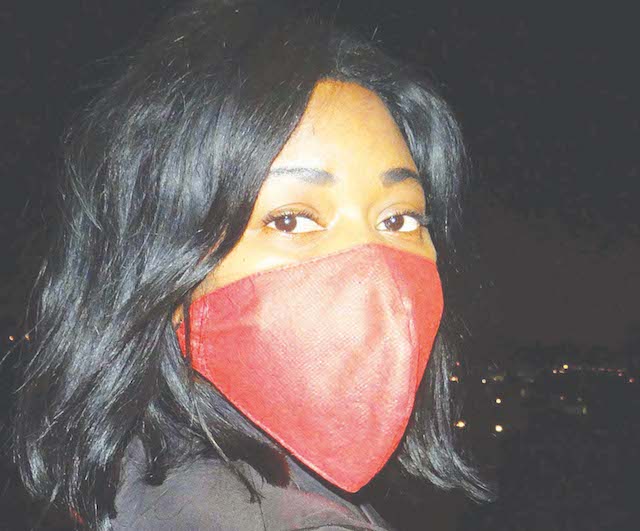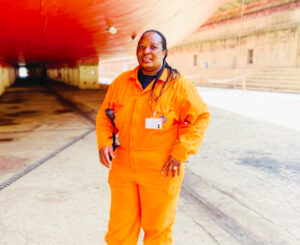[ad_1]
Windhoek. The year 2222.
A smartboard is uploading the day’s history lesson to the microchip in each of a group of high school students’ cerebral cortexes.
The risk gauges on their anti-Covid-2219 bands blink a reassuring green to indicate the classroom’s virus-free air and I, a sentient fly on the wall, am perched on the shoulder of an ApplePfizer Edubot as they grimly consider The Virulent Twenties.
“The trouble with dystopian civilisations is that it takes them a while to see beyond their failed societies,” says the edubot. “In The Virulent Twenties – not to be confused with the roaring of Fitzgerald fame – humankind was fighting a new plague which lingers to this day and a much older one of patriarchy and sexual and gender-based violence… Yes, Talavera?”
A student raises their hand, blinks rapidly as they scroll through their memory bank and nods before refocusing on the edubot.
“It’s funny that you mention The Virulent Twenties, educator. My parent is a bit of a family historian. They have terabytes and terabytes of archival drives, plenty of point-of-view legacy footage and, just the other evening, they told me about a great, great, great ancestor of ours who lived during that time,” says Talavera, a famed and unrepentant meanderer who speeds it along as the edubot projects a vaudeville hook onto the smartboard.
“Racing back to the point, educator! Back then, things between the so-called sexes and the genders were very primitive. In fact, the daily logs of the time were so full of stories of men raping, abusing and killing women and children, that my ancestor Philippe presented a photographic exhibition titled ‘The Caring Namibian Man’.
Ancestor Philippe wanted to show an alternative to the archetype of the violent male and let men know that it’s okay to be kind, communicate effectively and with emotion, not beat their wives, do laundry, cook food and show affection to their children.”
The class erupts into disbelieving laughter.
“No, seriously! I have some scenes from a journalist’s point-of-view banks. They were viewing ‘The Caring Namibian Man’ exhibition the day a group of students came to see it. May I?”
The edubot gestures for Talavera to play their slide and the room dissolves into a vivid virtual reality.
“Siri, situate!” requests a student.
“Goethe-Institut Namibia gallery, 5 Fidel Castro Street, Windhoek, Namibia. The date is 17 August 2022,” chimes Siri as a group of virtual male high school students saunter into the classroom.
As the students watch, their ancient counterparts view the collection of photographs in the virtual gallery space. The images are static, antique captures exhibited crudely on walls, and show men doing simple things like helping elders, cooking for their families, processing fresh produce and carrying their children.
It’s routine stuff. Things that are either automated or done by the spectrum of humans in 2222. But the students can see it’s a big, subversive deal by the way their ancestors discuss an aspirational exhibition celebrating one type of human doing rudimentary domestic tasks while functioning as non-violent, benevolent, present and participating members of their community.
“They had to have exhibitions about this kind of thing?” says a student.
“Why would a man carrying and caring for their own child be seen as weak or effeminate?” says another.
“What is a breadwinner and why couldn’t it be a woman? Wait, did they have competitions for carbohydrates in the past? The Virulent Twenties sound rough,” comments one more.
The Goethe-Institut gallery dissolves as Talavera ends their smartboard broadcast and the students look to the edubot to sum up.
“History always looks farcical in retrospect but we know exhibitions like this, the Anti-Patriarchy Protests and The Great Reset of 2040 all lead us to today when you can hardly fathom such primitive gender roles or such high levels of violence against women, children and LGBTQIA+ people. For that, we must remain grateful,” says the edubot.
“Now, everybody save today’s lesson to your cerebral chip, log out and be sure to steer clear of the city centre. The Human Defence Force has reported zombie activity on Independence Avenue.”
“Again?” says Talavera with a soul-deep groan.
“Now, now, it could be worse,” says the edubot with a metallic chuckle.
“It could be 2022.”
Martha Mukaiwa on Twitter and Instagram; marthamukaiwa.com
[ad_2]
Source link




